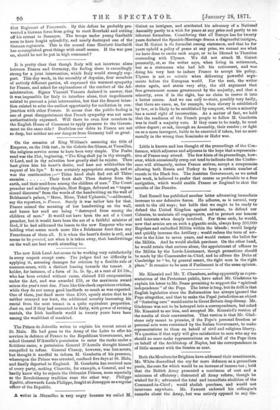On the occasion of King William's assuming the title of
Emperor, on the 18th inst., in the Galerie des Glaces, at Versailles, the religious service seems to have been very simple. The Psalm read was the 21st, beginning, "The King shall joy in thy strength, 0 Lord, and in thy salvation how greatly shall he rejoice. Thou bast given him his heart's desire, and hest not withholden the request of his lips." It was certainly appropriate enough, and so was the continuation ;—" Thine hand shalt find out all Thine enemies Their fruit shalt Thou destroy from the earth, and their seed from among the children of men." The Court preacher and military chaplain, Herr Rogge, delivered an "impas- sioned discourse" from the words of the handwriting on the wall of Belshazzar's palace, " Mene, lane, Tekel Upharsin,"—addressed, say the reporters, to France. Surely it was rather late for that. France missed the meaning of her handwriting on the wall, and hence her seed are being "destroyed from among the children of men." It would not have been the act of a Court preacher, but it would, have been the act of a faithful minister of God, if he had addressed the lesson to the new Emperor who was holding what seems much more like a Belshazzar feast than any Frenchman of them all. It is when the heart's desire is evil, and seems to be granted, not when it is taken away, that handwritings on the wall are best worth attending to.


































 Previous page
Previous page